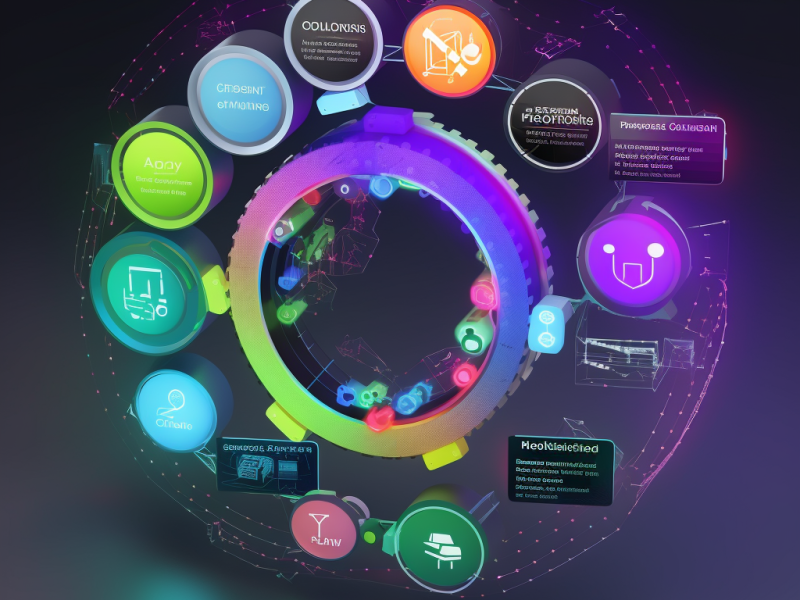DevOps, a compound of development (Dev) and operations (Ops), stands for a set of practices that combines software development and IT operations. The goal is to shorten the systems development life cycle while delivering features, fixes, and updates frequently in close alignment with business objectives. In the realm of AI and ML, DevOps takes on additional complexity. Unlike traditional software, AI/ML systems heavily rely on data quality, model accuracy, and continuous learning. DevOps for AI/ML, often referred to as MLOps, focuses on streamlining the machine learning lifecycle from data collection to model training, validation, deployment, and monitoring.
Challenges in the AI/ML Lifecycle
The challenges in the AI/ML lifecycle are multifaceted and can significantly impact the success of machine learning projects. One of the primary hurdles is data management, which involves not only the collection and storage of large volumes of data but also ensuring its quality, relevance, and governance. Ensuring data privacy and security is another aspect that requires rigorous attention and adherence to regulations. In model training, challenges include selecting the right algorithms, optimizing for performance, and managing the computational resources needed for processing. Hyperparameter tuning is an iterative and often time-consuming process that seeks to enhance model accuracy. The deployment of models introduces another layer of complexity. Integrating ML models into production environments requires careful planning to ensure that they interact seamlessly with existing systems. It also demands robust infrastructure that can support the scaling of models to handle real-world data and user loads. Monitoring model performance post-deployment is crucial, as models may suffer from drift due to evolving data patterns. Ensuring models remain accurate over time and adapting to changes is a constant challenge that requires ongoing model evaluation and retraining.
Principles of DevOps Applied to AI/ML
Incorporating DevOps principles into AI/ML processes is pivotal for streamlining workflows and enhancing cross-functional collaboration. Automation emerges as a cornerstone, simplifying tasks ranging from data handling to model deployment, thereby reducing manual intervention and accelerating iterative cycles. Continuous Integration and Continuous Delivery serve as the backbone of a dynamic environment where code and model updates are integrated and deployed rapidly and reliably, ensuring that new features and improvements are promptly available. To maintain quality, continuous testing is embedded into every phase, guarding against regressions and performance degradation. Monitoring is perpetual, yielding insights into application performance and model accuracy, alerting teams to any drift or anomalies that may arise. Essential to this ecosystem is the culture of collaboration, with transparent communication channels established among data scientists, developers, and operations personnel. This shared approach is supported by rigorous version control of code, data, and configurations, which upholds reproducibility and facilitates traceability. Configuration management as code further guarantees environmental consistency. Security and compliance are weaved through the entire lifecycle, safeguarding sensitive data and adhering to regulatory standards, thus fortifying the integrity of AI/ML initiatives within the DevOps framework.
Tools and Technologies for AI/ML DevOps
The landscape of AI/ML DevOps is enriched by a suite of specialized tools and technologies designed to address the complexities of machine learning projects. Version control systems like Git provide the foundation for tracking and documenting iterative changes. Automated testing frameworks, such as PyTest and DVC, ensure model integrity across updates. CI/CD services like Jenkins, CircleCI, and GitHub Actions automate code integration and model deployment processes. Orchestration platforms, notably Kubernetes and Docker Swarm, manage containerized applications for consistent environment configurations. Experiment tracking and management tools, including MLflow and Weights & Biases, organize the lifecycle of machine learning projects and ensure reproducibility. Model serving frameworks such as TensorFlow Serving and TorchServe handle the deployment of models at scale, while monitoring and logging tools like Prometheus, Grafana, and the ELK Stack keep tabs on system performance. Data preparation and pipeline management tools, Apache Airflow and Luigi, automate data workflows critical to training. Collaboration platforms like Jupyter Notebooks, Google Colab, and Databricks Workspace foster shared interactive analyses, ensuring that teams can efficiently progress from concept to production, embodying the DevOps ethos in their AI/ML endeavors.
Best Practices for Implementing AI/ML DevOps
To implement AI/ML DevOps effectively, organizations should adhere to best practices. Emphasizing collaboration between data scientists, developers, and operations teams is vital for a unified workflow. Establishing clear communication channels and documentation is essential for transparency. Automating repetitive tasks reduces errors and frees up time for innovation. Prioritizing security and compliance is also critical, especially when dealing with sensitive data. Lastly, fostering a culture of continuous improvement encourages teams to adapt and evolve their practices over time.
The integration of DevOps practices into AI/ML projects is not just a trend but a necessity for those aiming to stay competitive in the rapidly evolving technological landscape. By understanding and overcoming the unique challenges in the AI/ML lifecycle, applying the principles of DevOps, utilizing the right tools and technologies, and adhering to best practices, organizations can achieve a harmonious workflow that accelerates innovation and provides tangible business value. As AI and ML continue to transform industries, adopting a DevOps mindset will be crucial for the seamless development, deployment, and maintenance of intelligent systems.
Let’s work together to transform your AI/ML development lifecycle into a more productive and agile process. Contact us for a consultation, and discover how our DevOps solutions can empower your AI/ML initiatives.

